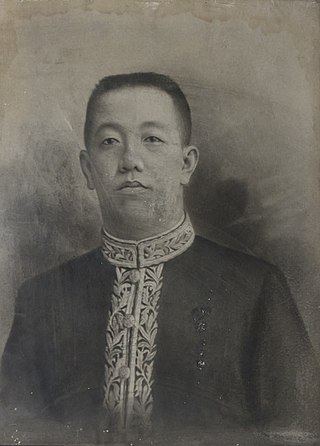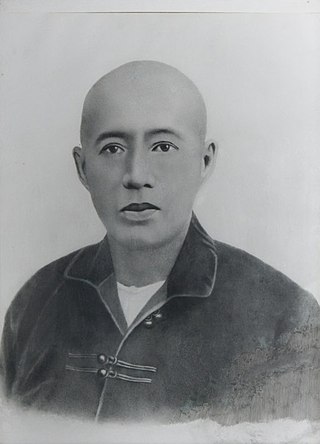Related Research Articles

Khouw Kim An, 5th Majoor der Chinezen was a high-ranking Chinese Indonesian bureaucrat, public figure and landlord who served as the fifth and last Majoor der Chinezen of Batavia, Dutch East Indies. The Chinese Mayoralty was the highest-ranking, Chinese government position in the East Indies with considerable political and judicial jurisdiction over the colony's Chinese subjects. The Batavian Mayoralty was one of the oldest public institutions in the Dutch colonial empire, perhaps second only in antiquity to the viceregal post of Governor-General of the Dutch East Indies.

Kan Hok Hoei Sia, generally known as Hok Hoei Kan or in short H. H. Kan, was a prominent public figure, statesman and patrician landowner of Peranakan Chinese descent in the Dutch East Indies.
Khouw Oen Giok Sia, later more popularly known as Oen Giok Khouw or O. G. Khouw, was a philanthropist and landowner in the Dutch East Indies. He gained notoriety for acquiring Dutch citizenship, thus breaking down the race barriers of colonial society. Today, he is best remembered for his extravagant mausoleum in Petamburan, Jakarta.
Khouw Tian Sek, Luitenant der Chinezen, popularly known as Teng Seck, was a Chinese Indonesian landlord in colonial Batavia. He is best known today as the patriarch of the prominent Khouw family of Tamboen.

The Khouw family of Tamboen was an aristocratic landowning dynasty of bureaucrats and community leaders, part of the Cabang Atas or the Peranakan Chinese gentry of colonial Indonesia.
Khouw Tjeng Tjoan, Luitenant-titulair der Chinezen was a Chinese-Indonesian magnate and landlord.

Sia was a hereditary, noble title of Chinese origin, used mostly in colonial Indonesia. It was borne by the descendants of Chinese officers, who were high-ranking, Chinese civil bureaucrats in the Dutch colonial government, bearing the ranks of Majoor, Kapitein or Luitenant der Chinezen.
Khouw Tjeng Kee, Luitenant-titulair der Chinezen was a Chinese-Indonesian magnate and landlord in Batavia, capital of the Dutch East Indies.

Khouw Yauw Kie, Kapitein der Chinezen, also spelled Khouw Jaouw Kie, Yaouw Kee, was a high-ranking Chinese-Indonesian bureaucrat. He was the first scion of the influential Khouw family of Tamboen to serve on the Chinese Council of Batavia.
Khouw Tjeng Po, Luitenant-titulair der Chinezen was a Chinese-Indonesian magnate and landlord in Batavia, capital of the Dutch East Indies.

Lie Tjoe Hong, 3rd Majoor der Chinezen was a Chinese-Indonesian bureaucrat who served as the third Majoor der Chinezen, or Chinese headman, of Batavia, now Jakarta, capital of Indonesia. This was the most senior Chinese position in the colonial civil bureaucracy of the Dutch East Indies. As Majoor, Lie was also the Chairman of the Chinese Council of Batavia, the city's highest Chinese government body.
Tan Liok Tiauw Sia was a prominent Chinese-Indonesian landowner, planter and industrial pioneer in the late colonial period, best known today as the last Landheer of Batoe-Tjepper, now the district of Batuceper.

The Cabang Atas — literally 'highest branch' in Indonesian — was the traditional Chinese establishment or gentry of colonial Indonesia. They were the families and descendants of the Chinese officers, high-ranking colonial civil bureaucrats with the ranks of Majoor, Kapitein and Luitenant der Chinezen. They were referred to as the baba bangsawan [‘Chinese gentry’] in Indonesian, and the ba-poco in Java Hokkien.
Khouw is a Dutch-based romanization of the Hokkien surname Xǔ (許) in West Java, Indonesia. In Central and East Java, Kho is a more common romanization.

Tan Tjoen Tiat, 2nd Majoor der Chinezen was a Chinese-Indonesian bureaucrat who served as the second Majoor der Chinezen, or Chinese headman, of Batavia, now Jakarta, capital of Indonesia. This was the most senior Chinese position in the colonial civil bureaucracy of the Dutch East Indies. As Majoor, Tan was also the Chairman of the Chinese Council of Batavia, the city's highest Chinese government body.
Aw Tjoei Lan, better known as Njonja Kapitein Lie Tjian Tjoen, sometimes spelt Auw Tjoei Lan, was a Chinese-Indonesian philanthropist, community leader, social activist and founder of the charity organization 'Ati Soetji'. Through her foundation, she fought against human trafficking and prostitution, and promoted education among orphans, in particular young girls.
Kang Keng Tjong, also spelt Kan Keng Tiong, was a Chinese-Indonesian tycoon and one of the richest men in Batavia, capital of the Dutch East Indies.
Tan Tiang Po, Luitenant der Chinezen, also spelled Tan Tjeng Po, was a colonial Chinese-Indonesian bureaucrat, landowner, philanthropist and the penultimate Landheer (landlord) of the domain of Batoe-Tjepper in the Dutch East Indies.

The Lie family of Pasilian was an aristocratic Chinese-Indonesian family of landlords, officials and community leaders, part of the ‘Tjabang Atas’ or the Peranakan Chinese gentry of the Dutch East Indies. For over a century, from 1847 until the 1952, members of the family served as Chinese officers, producing a total of nine office-holders, including Lie Tjoe Hong, the third Majoor der Chinezen of Batavia. The Chinese officership, consisting of the ranks of Majoor, Kapitein and Luitenant der Chinezen, was an arm of the Dutch colonial government with administrative and judicial jurisdiction over the colony's Chinese subjects.
Oey Liauw Kong, Kapitein der Chinezen (1799–1865) was a Chinese-Indonesian high official, Landheer (landlord) and head of the Oey family of Kemiri, part of the 'Tjabang Atas' or Peranakan gentry. He was also the owner of the 18th-century Baroque mansion and Jakarta landmark, Toko Merah.
References
- 1 2 3 4 5 Wright, Arnold; Breakspear, Oliver T. (1909). Twentieth Century Impressions of Netherlands India: Its History, People, Commerce, Industries and Resources. London: Lloyd's Greater Britain Publishing Company. Retrieved 14 February 2022.
- 1 2 Lohanda, Mona (1996). The Kapitan Cina of Batavia, 1837–1942: A History of Chinese Establishment in Colonial Society. Jakarta: Djambatan. ISBN 9789794282571 . Retrieved 14 February 2022.
- 1 2 3 4 5 Erkelens, Monique (15 October 2013). The decline of the Chinese Council of Batavia: the loss of prestige and authority of the traditional elite amongst the Chinese community from the end of the nineteenth century until 1942. Leiden: Leiden University. Retrieved 14 February 2022.
- 1 2 3 4 5 Haryono, Steve (2017). Perkawinan Strategis: Hubungan Keluarga Antara Opsir-opsir Tionghoa Dan 'Cabang Atas' Di Jawa Pada Abad Ke-19 Dan 20. Utrecht. ISBN 978-90-90-30249-2 . Retrieved 14 February 2022.
{{cite book}}: CS1 maint: location missing publisher (link) - ↑ "Javasche courant". Nagelaten Boedels (in Dutch). Landsdrukkerij. 12 January 1832. Retrieved 14 February 2022.